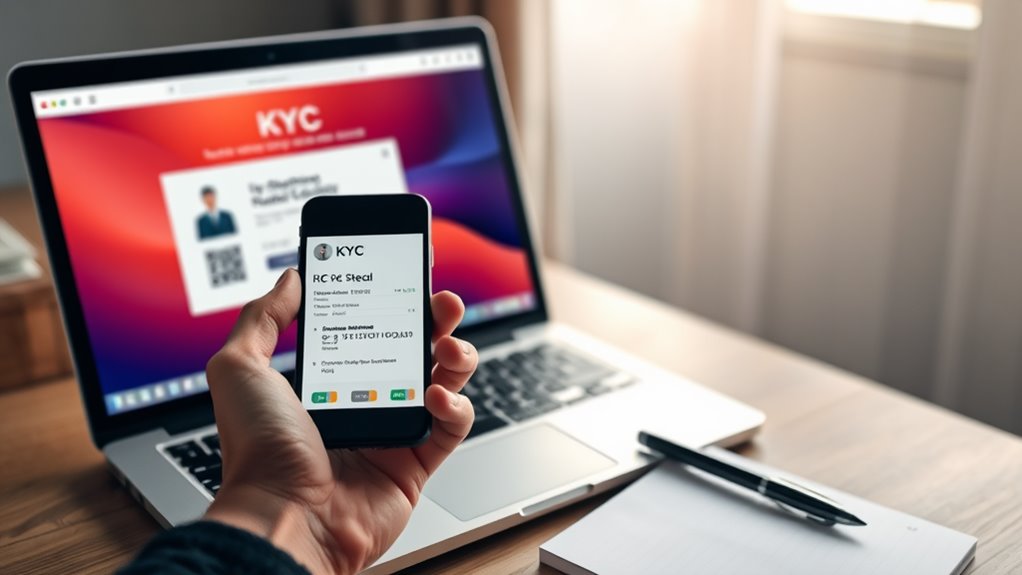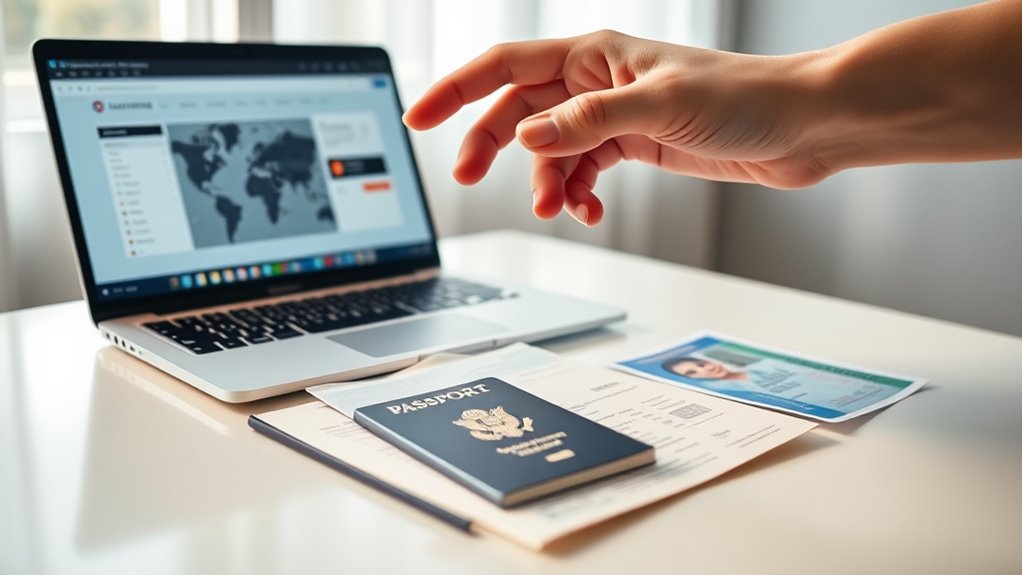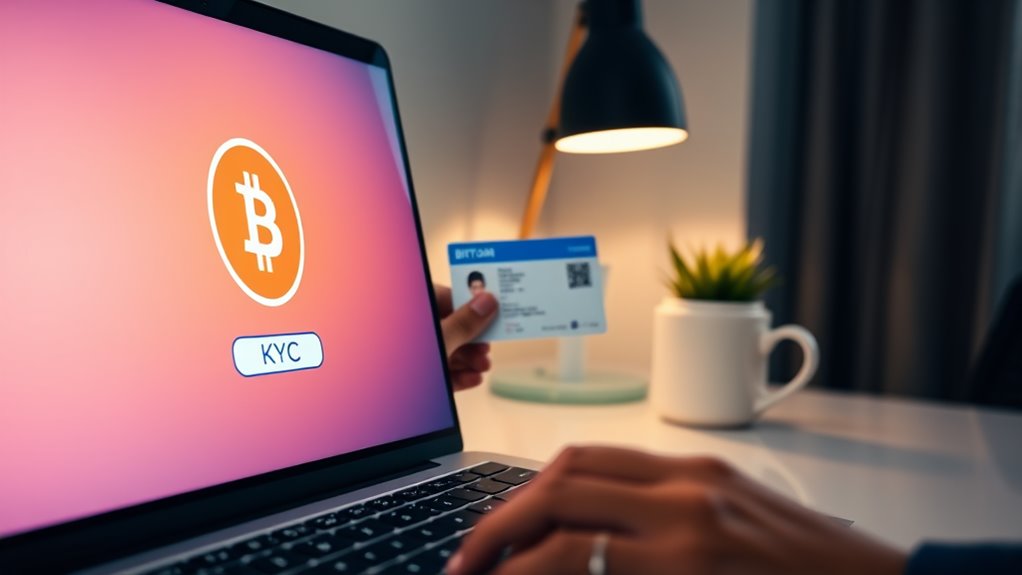
Bitcoin KYC Process: How Exchanges Verify You
The Bitcoin KYC process is essential for exchanges to confirm user identities and comply with regulations. Users must register by providing an email and creating a password. They submit personal information, including their name, address, and date of birth. Required documents, such as government-issued IDs and proof of address, are collected. Advanced methods like facial recognition and live video verification enhance security. These measures protect against fraud while ensuring user privacy. More details about the process follow.
Table of Contents
Key Takeaways
- Users must register with an email and password, followed by verification of their email and phone number for security.
- KYC verification requires submission of identification documents, including government-issued IDs and proof of address.
- Exchanges utilize advanced verification methods such as facial recognition and liveness detection to confirm user identity.
- Document verification involves scanning IDs and ensuring documents are recent, typically issued within the last three to six months.
- Compliance with regulations like GDPR is essential, ensuring user privacy while protecting against identity theft and fraud.
Understanding the Importance of KYC in Bitcoin Exchanges

Understanding the importance of Know Your Customer (KYC) processes in Bitcoin exchanges is essential for several reasons.
KYC regulations classify these exchanges as money services businesses, meaning they must adhere to strict legal requirements. Compliance with KYC procedures helps prevent money laundering and other illicit activities, supporting a legal framework for operations.
Regulatory authorities mandate KYC to verify user identities and mitigate risks associated with anonymous transactions. Failure to comply can lead to significant penalties, including fines and operational suspensions.
Additionally, robust KYC processes foster consumer trust by ensuring legal compliance and security, protecting users from fraud.
Ultimately, effective KYC measures enhance both the integrity of the market and the overall user experience on crypto exchanges.
Step-by-Step Account Setup Process

The account setup process for cryptocurrency exchanges involves several key steps that users must follow.
Initially, individuals need to register by providing their email address and creating a password, followed by verifying their email and phone numbers.
Subsequently, users must prepare and submit the required identification documents to complete the KYC verification, ensuring a secure and compliant account setup.
Account Registration Details
Creating an account on a cryptocurrency exchange involves several critical steps that guarantee both security and compliance with regulations.
Initially, users must access the exchange’s official website and click the “Sign Up” or “Create Account” button. They will then enter basic information, including an email address and password, before proceeding to verify their email through a link sent to them.
Some exchanges may also require phone number verification for added security. Following registration, it is advisable to enhance account protection by enabling two-factor authentication (2FA) and choosing a strong password. Additionally, selecting a reputable exchange is essential for ensuring user safety and compliance, as it directly impacts the overall trading experience.
Regular monitoring of account activity is recommended to identify any suspicious behavior, ensuring that the account remains secure as users prepare for the next steps in the KYC process.
Verification Document Requirements
Verification document requirements play an essential role in the Know Your Customer (KYC) process, ensuring that users comply with regulations while securing their accounts.
Typically, exchanges require government-issued IDs, such as passports or driver’s licenses, alongside proof of address, like utility bills or bank statements. Some platforms may ask for additional documents, including proof of source of funds.
It is important that all documents are recent, usually issued within the last three to six months, with shorter timeframes for certain countries. Exchanges vary in their specific requirements, driven by regulatory compliance and risk assessment.
To maintain security, exchanges may also implement advanced verification methods, such as facial recognition or video calls, enhancing the overall verification process.
Personal Information Collection for Verification

Personal information collection is a critical component of the Know Your Customer (KYC) process in cryptocurrency exchanges.
To verify a user’s identity, exchanges typically require essential information such as the individual’s name, address, date of birth, and contact details, including a phone number and email address. This data helps confirm that users are who they claim to be and assesses their risk profiles for potential fraud or money laundering.
Exchanges require essential personal information to verify identities and assess risks related to fraud and money laundering.
Methods for collecting this information include manual input through digital forms, automated tools like optical character recognition, and phone or email verification.
Ensuring compliance with legal requirements and enhancing user trust are central to these processes, illustrating the importance of secure data collection in the cryptocurrency landscape.
Document Submission Requirements

In the Bitcoin KYC process, document submission requirements play a vital role in verifying a user’s identity and financial background.
Essential identification documents such as passports and driver’s licenses are commonly required, alongside methods for proving one’s current address, like utility bills or bank statements.
Additionally, exchanges may request further information to guarantee compliance and mitigate risks associated with transactions.
Required Identification Documents
When engaging in the Bitcoin KYC process, individuals are required to submit specific identification documents to guarantee compliance with regulations.
Commonly accepted documents include government-issued IDs such as passports, driver’s licenses, and national ID cards. It is essential that these documents are valid and not expired, as well as intact without any alterations or damage.
Typically, exchanges accept scanned copies or photographs of the IDs, although acceptance may vary by country and exchange specifications.
Additionally, personal details such as the user’s name, date of birth, and sometimes national ID number are required for verification.
Exchanges may also implement technology like facial recognition to further authenticate the user’s identity during this process.
Address Verification Methods
Address verification methods play a critical role in the Know Your Customer (KYC) process, ensuring that users are who they claim to be and reside at the address they provide.
Typically, exchanges require users to submit specific documents for verification, such as utility bills, bank statements, government correspondence, and insurance documents. These documents must be recent, usually issued within the last six months, and presented in full portrait mode.
Sensitive information, such as bank account numbers, should be masked to protect privacy. Additionally, documents must remain unaltered except for these masked fields.
Acceptable formats include both printed and digital copies, but requirements may differ based on jurisdiction, reflecting the need for compliance with local regulations.
Additional Information Requests
To guarantee a thorough verification process, many cryptocurrency exchanges may request additional information beyond basic identification documents. This extra data helps facilitate compliance with regulations and enhances security.
Commonly requested items include:
- Proof of Income: Exchanges may require documentation showing the source of funds to confirm legitimacy.
- Biometric Verification: Some platforms ask for a selfie or facial recognition to match the user’s identity with their submitted ID.
- Contact Information: Valid phone numbers and email addresses are often necessary for communication and account notifications.
Advanced Verification Methods: Facial Recognition and More

Advanced verification methods have become increasingly essential in the Know Your Customer (KYC) process, particularly with the rise of digital currencies like Bitcoin.
Techniques such as facial recognition technology utilize artificial intelligence to match a user’s face with images on their identification documents. Liveness detection guarantees users are real by requiring actions like blinking during verification.
Document verification involves scanning and validating government-issued IDs, while biometric authentication includes fingerprint and voice recognition for added security.
Document verification and biometric authentication enhance security by validating IDs and employing fingerprint and voice recognition.
Live video verification allows users to confirm their identity in real time by showing their ID.
These advanced methods aim to enhance accuracy and prevent fraud, making certain that exchanges comply with regulatory requirements while protecting user identities.
Ensuring Security and Privacy During KYC Compliance

Ensuring security and privacy during the Know Your Customer (KYC) compliance process is essential for both exchanges and users. Reputable exchanges employ several strategies to protect user information effectively:
- Data Protection Measures: Advanced encryption methods safeguard sensitive data, preventing unauthorized access during the KYC process.
- Regulatory Compliance: Adhering to regulations like the General Data Protection Regulation (GDPR) enhances user privacy and security.
- Secure Authentication: Protocols for secure authentication verify identities while ensuring personal data integrity.
These measures aim to address user privacy concerns while maintaining compliance with stringent regulations.
Continuous monitoring and device fingerprinting further enhance security, assuring users that their information is handled responsibly and transparently throughout the KYC process, fostering trust in the exchange environment.
Frequently Asked Questions
How Long Does the KYC Verification Process Typically Take?
The KYC verification process typically takes several minutes to a few days, depending on factors like documentation completeness, verification levels, and demand. Automated systems can expedite this, while manual checks may prolong the timeframe.
Can I Use a Temporary Address for KYC Verification?
A user attempting to register with a temporary address may face challenges during KYC verification. Most exchanges prefer permanent addresses to guarantee compliance and mitigate risks, potentially leading to account limitations if verification fails.
What Happens if My KYC Application Is Rejected?
Upon KYC application rejection, an individual may face restricted access to trading features, potential account suspension, and the need to rectify documentation issues. Exploring alternative exchanges and reviewing guidelines can help facilitate future applications.
Are There Fees Associated With the KYC Process?
Many users wonder about KYC fees after hearing stories of traders facing unexpected charges. Generally, KYC processes incur no direct fees; however, some exchanges may offset costs through higher trading fees or premium service charges.
Can I Change My Personal Information After Verification?
Changing personal information after verification is possible, but typically requires contacting support, providing updated documentation, and undergoing re-verification. Processes vary by exchange, necessitating adherence to compliance regulations and ensuring account security throughout the update.
Conclusion
To sum up, the KYC process is essential for ensuring security and compliance within Bitcoin exchanges. By verifying user identities, exchanges can help prevent fraud and money laundering. Curiously, a study found that over 90% of cryptocurrency exchanges have implemented some form of KYC measures. This statistic highlights the widespread recognition of the importance of identity verification in promoting a safer trading environment. As the cryptocurrency market continues to evolve, KYC practices will likely remain a critical component.



